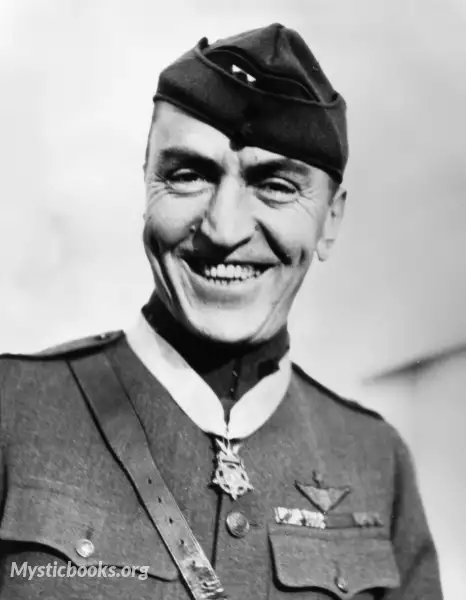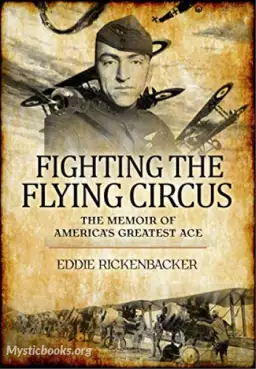
Timeline
Title
Country/Nationality
Eddie V. Rickenbacker
Edward Vernon Rickenbacker was an American fighter ace in World War I and a Medal of Honor recipient. With 26 aerial victories, he was the United States' most successful fighter ace in the war and is considered to have received the most awards for valor by an American during the war. He was also a race car driver and automotive designer, a government consultant in military matters and a pioneer in air transportation, particularly as the long-time head of Eastern Air Lines.
Edward Rickenbacker was born at 1334 East Livingston Avenue in Columbus, Ohio, the third child to Swiss immigrants. His father, Wilhelm Rickenbacher, aspired to own his own house-building business, but remained stuck in wage labor for breweries and street-paving crews. His mother Lizzie, née Liesl Basler, took in laundry to supplement the family income. With a loan from Lizzie's parents, the couple was able to purchase a small home on Livingston Avenue, at the edge of the city limits, two miles southeast of downtown. Edd, as he was called, was three years old.
Edd's childhood came to a halt in the summer before his fourteenth birthday. On a hot July day, a black man named William Gaines asked for handouts from Willhelm Rickenbacher's sidewalk crew during their lunch break. Rickenbacher objected--"If I had any dinner to share with any person I would share it with my children."—and wouldn't let the matter drop. Gaines hit him over the head with a level, he later claimed in self-defense. Rickenbacher was in a coma for almost six weeks before his death on August 26, 1904. Gaines was convicted of manslaughter and sentenced to ten years in prison. Rickenbacker's biographer, David Lewis, believed that the relatively lenient verdict of a white jury toward a black man suggests that William Rickenbacher did in fact threaten Gaines.
Though his older brother Bill and older sister Mary were working, Edd felt a responsibility to replace his father's lost income. He dropped out of school and went to work full-time. He worked eight different jobs during the next two years. He was driven by an intense admiration for machines, Rickenbacker taught himself as much as he could, including enrolling in a correspondence course in engineering, which he pursued while working at the Oscar Lear Automobile Company on the corner of Fourth and Gay Streets.
In late May, 1917, a week before he was to race in Cincinnati, Rickenbacker was invited to be chauffeur for General John J. Pershing. By mid-June, he was "somewhere in France," driving Army officials between Paris and A.E.F. headquarters in Chaumont, between headquarters and various points on the Western Front.
Rickenbacker was given a rank of Sergeant First Class but did not drive for General Pershing. He mostly drove for Major Dodd, whom he had met in late 1916. Once again, Rickenbacker made an important connection by repairing a superior's broken-down car, famously by fashioning a bearing of babbitt metal in a sand mold at a country mechanic's shop for Lieutenant Colonel Billy Mitchell. Mitchell, a rising officer in the aviation section of the Army's Signal Corps, was impressed. He was just the man Rickenbacker needed to ingratiate in order to get flight training, still his main goal.
Rickenbacker made his first sortie with Reed Chambers on April 13, which almost ended in disaster when both became lost and Chambers had to make a forced landing. Flight commander David Peterson called Rick a "bloody fool for flying off in a fog." Two weeks later, on April 29, 1918, Rickenbacker shot down his first enemy plane. On May 28, he claimed his fifth victory to become an ace. Rickenbacker was awarded the French Croix de Guerre that month for his five victories. This success did not mean the end of difficulties, however. Several times he almost fired on friendly planes. He nearly crashed when the fabric on his Nieuport's wing tore off in a dive. He mourned the death of Lufbery. And his guns kept jamming whenever he went in for the kill.
Rickenbacker was awarded the Distinguished Service Cross a record eight times. One of these awards was converted in 1930 to the Medal of Honor.He was also awarded the Legion of Honor and the Croix de Guerre by France. In 1919, Rickenbacker was discharged from the Army Air Service with the rank of captain, which he had obtained sometime in September.
Books by Eddie V. Rickenbacker

Fighting the Flying Circus
This is the WWI memoirs of Medal of Honor winner, Capt Eddie Rickenbacker. He fought in and eventually became commander of the 94th "Hat-in-the-Ring" Squadron, which ended the war with the highest number of air victories of any American squadron. The...